Happy 2019! My first interview this year is with Deborah Swift who is one of a team of bestselling WWII historical fiction authors. Their anthology, The Darkest Hour, includes ten never before published novellas exploring the theme of ‘resistance’ during WWII.
 Deborah Swift used to be a set and costume designer for theatre and TV, during which time she developed a love of research which fuelled her passion for the past. She holds an MA in Creative Writing from Lancaster University and also writes successful seventeenth century historicals. Her WW2 novel Past Encounters was a BookViral Readers Award Finalist for WW2 fiction. You can connect with Deborah via her website, Twitter @swiftstory or follow her on Amazon.
Deborah Swift used to be a set and costume designer for theatre and TV, during which time she developed a love of research which fuelled her passion for the past. She holds an MA in Creative Writing from Lancaster University and also writes successful seventeenth century historicals. Her WW2 novel Past Encounters was a BookViral Readers Award Finalist for WW2 fiction. You can connect with Deborah via her website, Twitter @swiftstory or follow her on Amazon.
You can purchase The Darkest Hour here. ***All proceeds will be donated to the United States Holocaust Memorial Museum In Washington DC.***
What or who inspired you to first write? Which authors have influenced you?
Like so many other authors, I have always loved reading and devoured stories when I was a child. At school I always loved those assignments like ‘What I did on my holidays’, but I used to spice them up with extra things the family didn’t actually do. To me, this didn’t seem like lying, but giving the teacher a more interesting story. Heaven only knows what the teacher thought my family was like, with holidays that included escaped convicts, secrets in attics, and dogs we didn’t possess! (And yes, I was heavily influenced by children’s versions of Dickens, Charlotte Bronte, and Enid Blyton.) Nowadays I still read widely, but enjoy books by Geraldine Brooks, Rose Tremain, Kristin Hannah, and Kate Atkinson.
What is the inspiration for your current book? Is there a particular theme you wished to explore?
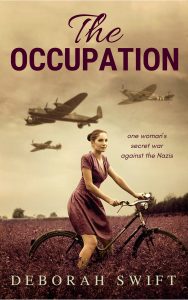 I’m currently collaborating with nine other authors on the anthology of novellas; The Darkest Hour. My novella, The Occupation, takes place on the island of Jersey during German Occupation in WW2. I’ve always been fascinated by stories of resistance, and read a newspaper article about a jerseywoman who hid her Jewish friend to prevent her deportation to a concentration camp. So my story is based on a true one. My protagonist Celine, like in the true story, is married to a German who has been conscripted against his will into the German army. I wanted to explore the different tensions that grew from her courage.
I’m currently collaborating with nine other authors on the anthology of novellas; The Darkest Hour. My novella, The Occupation, takes place on the island of Jersey during German Occupation in WW2. I’ve always been fascinated by stories of resistance, and read a newspaper article about a jerseywoman who hid her Jewish friend to prevent her deportation to a concentration camp. So my story is based on a true one. My protagonist Celine, like in the true story, is married to a German who has been conscripted against his will into the German army. I wanted to explore the different tensions that grew from her courage.
Jersey is a British territory, and being a Brit, it was interesting to research the effect of the occupation on the islanders. I suppose because it was so close to home, and gave a terrifying idea of how I might react if my town was suddenly taken over by an alien force. In another way, I wanted to explore the idea of ‘occupation’ itself, a large task for a short novella, but one I thought was important in this world of shifting migration.
What period of history particularly inspires or interests you? Why?
Many periods of history inspire me, and I have a hard time choosing which to go for every time I start a new novel. I have two main strands at the moment; the 17th Century and WW2. That probably seems strange – there are quite a few centuries between them! But for me these periods have enduring appeal because the effect they wrought on public and private life in the UK and US is still very visible. The 17th Century is a great time of political and religious upheaval, and a time of global expansion. WW2 reminds us of what is worth defending, and completely changed the role of women in society. I am particularly interested in how people resist oppression in whatever form it takes.
What resources do you use to research your book? How long did it take to finish the novel?
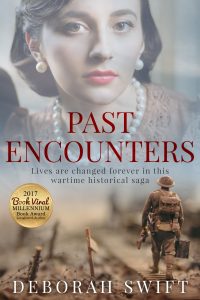 For my WW2 books I use original newspapers of the time, letters, and interviews. Eyewitness accounts are possible, and often my problem is not lack of material, but too much of it. A lot of sifting has to go on to pull out the best nuggets of information. Many WW2 accounts and letters, though poignant, are very dry and factual. They were not designed to be read as fiction, so the author has to invest them with life by looking at photographs, and adding the small details that bring the scene to life. A novel takes me a year to write, often more, as historical fiction is heavy on the research, and I like to build books to last – books that you can read more than once and see different aspects or depths to the story.
For my WW2 books I use original newspapers of the time, letters, and interviews. Eyewitness accounts are possible, and often my problem is not lack of material, but too much of it. A lot of sifting has to go on to pull out the best nuggets of information. Many WW2 accounts and letters, though poignant, are very dry and factual. They were not designed to be read as fiction, so the author has to invest them with life by looking at photographs, and adding the small details that bring the scene to life. A novel takes me a year to write, often more, as historical fiction is heavy on the research, and I like to build books to last – books that you can read more than once and see different aspects or depths to the story.
Do you use a program like Scrivener to create your novel? Do you ever write in long hand?
I don’t use Scrivener or any software except Word. I do write in longhand occasionally if I’m ‘on location’ doing research, or interviewing someone. I jot a lot of notes about setting, or snippets of conversation. My WW2 novel Past Encounters is set in my home town, so I interviewed a lot of people about their memories of the film ‘Brief Encounter’ that took place there in 1945.
Is there a particular photo or piece of art that strikes a chord with you? Why?
 For my story, The Occupation, this photo really struck me. The British ‘Bobby’ or Policeman, talking to a German officer on the streets of Jersey. The British policeman in those days symbolized order, justice and trustworthiness. The German officer wanted to impose the Nazi idea of ‘order’ which included ‘cleansing’ the streets of what they called ‘undesirables’ – Jews, communists, political activists and anyone who opposed their views.
For my story, The Occupation, this photo really struck me. The British ‘Bobby’ or Policeman, talking to a German officer on the streets of Jersey. The British policeman in those days symbolized order, justice and trustworthiness. The German officer wanted to impose the Nazi idea of ‘order’ which included ‘cleansing’ the streets of what they called ‘undesirables’ – Jews, communists, political activists and anyone who opposed their views.
What advice would you give an aspiring author?
Read, read, read, and write, write, write!
Tell us about your next book.
A word first about the other stories in the Anthology – they are all different, set in different places around the globe, and each author has produced their own take on the theme of ‘Resistance.’ I was really impressed with the quality of all the stories, and you can find out more about each of these gripping novellas here.
Meanwhile, to go alongside The Occupation, I am working on the story of Celine’s husband, Siegfried (Fred), and how it felt for him when he was conscripted into the German army, first to occupy France, then at the Russian Front. The two novellas will fit together to make a complete picture, though both will stand alone as separate stories.
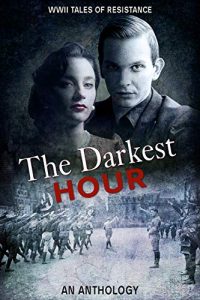
WW2. When the world falls to terror and tyranny reigns……how far would you go to resist?
Would you risk your own life or the lives of the ones you love?
From a young Jewish woman in love fighting her way out of the Warsaw ghetto, to a Czech assassin rising above his fears for an attempt on a Nazi Hangman’s life, to a daughter who vows to avenge her family by taking down a Japanese commander, and a French boy’s touching act of defiance no matter how small.
Come and get a glimpse of the invisible side of WWII – the Resistance, those who refuse to bow down to brutality.
Hold your breath and hope for the best in the darkest of times, when our heroes and heroines risk all to defy evil so the light of freedom will shine over their countries again.
This collection includes ten never before published novellas by ten of today’s bestselling WWII historical fiction authors.
Foreword by Terry Lynn Thomas, author of The Silent Woman, the USA Today Bestseller.
Featured Stories:
Bubbe’s Nightingale by Roberta Kagan
Catriona’s War by Jean Grainger
Reluctant Informer by Marion Kummerow
Killing the Hangman by Ellie Midwood
The Moon Chaser by Alexa Kang
Enemy at the Gate by Mary D. Brooks
The Occupation by Deborah Swift
Code Name Camille by Kathryn Gauci
V for Victory by John R McKay
Sound of Resistance by Ryan Armstrong
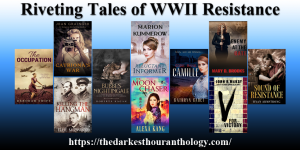
Buy The Darkest Hour *** All proceeds will be donated to the United States Holocaust Memorial Museum In Washington DC ***
Thanks Deborah – what a terrific project and such a good cause. Congratulations to all the authors!
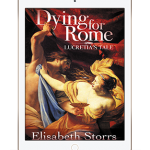 Haven’t subscribed yet to enter into giveaways from my guests? You’re not too late for the chance to win this month’s book if you subscribe to my Monthly Inspiration newsletter for giveaways and insights into history – both trivia and the serious stuff! In appreciation for subscribing, I’m offering an 80 page free short story Dying for Rome -Lucretia’s Tale.
Haven’t subscribed yet to enter into giveaways from my guests? You’re not too late for the chance to win this month’s book if you subscribe to my Monthly Inspiration newsletter for giveaways and insights into history – both trivia and the serious stuff! In appreciation for subscribing, I’m offering an 80 page free short story Dying for Rome -Lucretia’s Tale.



Sounds absolutely intriguing! I would love to read it.
Hi Jennifer, it is fora good cause too. I loved writing with that in mind.
This looks so good! Why am I just hearing about this now?! Gonna help spread the word. Cannot wait to read it!
I would love to read these. I am following on Amazon and added some to my TBR to purchase.
I love historical fiction,particularly WWII.I’m reading Remnant by Stan Poel right now.
Sounds like a great book!
Sounds amazing! I would love to read it! On my Goodreads TBR list! Thanks for the chance!
It truly was the darkest hour for Britain, and if they hadn’t had the courage and fortitude to hang on, the world could have turned into a very different place. I visited Guernsey a year ago and our guide was a fount of information about the occupation of the Channel Islands. I was especially struck with the children and the effects upon them.
I would love to read this WWII collection. I really enjoy reading about this period of history.
I had the privilege to tour Auschwitz when I was in college. It was an absolutely life changing experience. This book sounds amazing
Thank you for your comments everyone. It was a pleasure to team up with the other authors and I loved researching the island of Jersey. It is so inspiring to read of the courage of the population there under such difficult circumstances.
I want to read The Darkest Hour. It sounds so good!
fascinating! Sounds like a really interesting book for me to read this winter. Thanks for the chance, Deborah.
fascinating! Just what I was looking for to read this winter.
Thank you Deborah for the giveaway.
Cheers!
So nice to meet someone who does research in the history
behind your books.
Many don’t
Sometimes if I am curious about a fact will lookup. A few times I found nothing
Looking forward to reading your books.